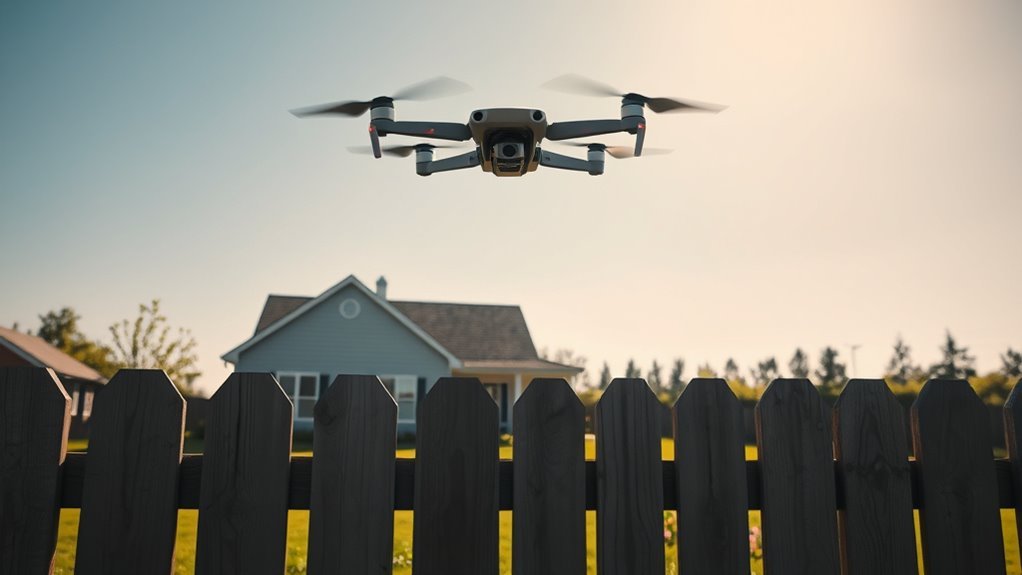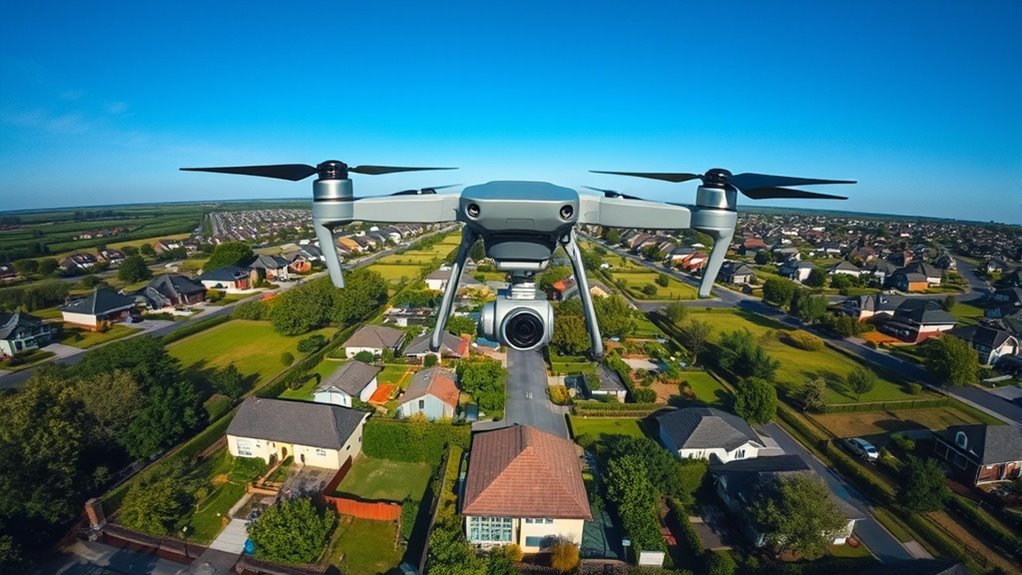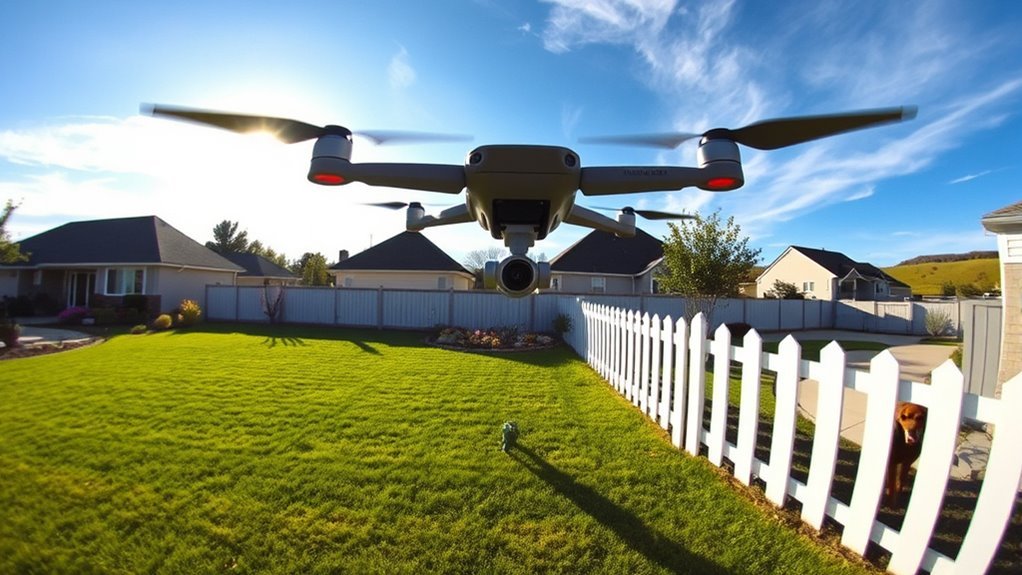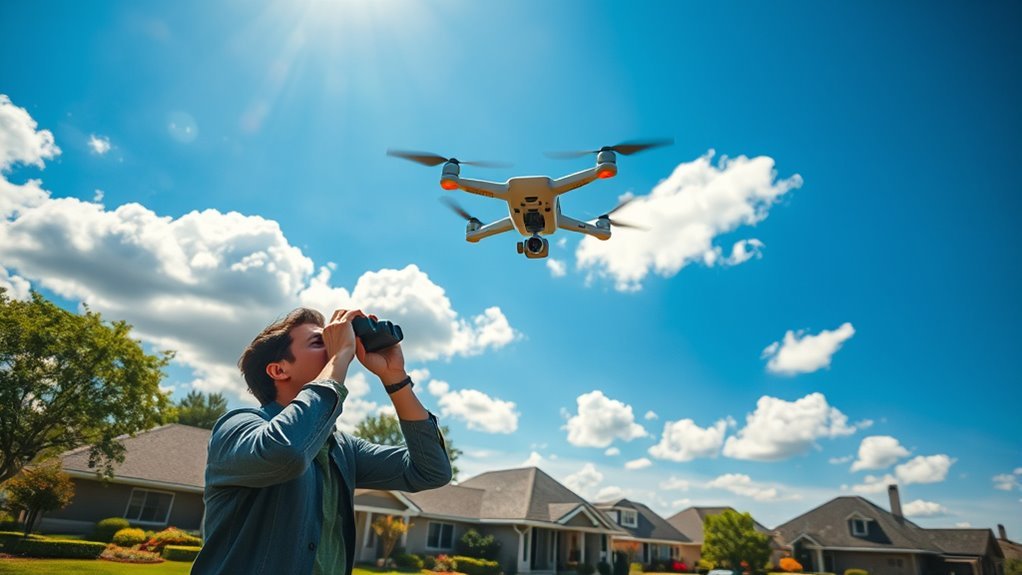To determine if drones can fly over your house, you need to take into account federal regulations, state and local laws. The FAA outlines where drones can operate, and local ordinances might have specific no-fly zones or altitude restrictions. Privacy concerns are also vital; drones with cameras might infringe on your personal space. Document any drone activity and consult local authorities if you have ongoing issues. Understanding these regulations will help clarify your property rights and potential actions moving forward.
Understanding Drone Regulations at the Federal Level

While it may seem straightforward, understanding federal drone regulations is vital for determining whether drones can fly over your property. The Federal Aviation Administration (FAA) establishes federal guidelines that govern drone operations, which are fundamental for your awareness. Drones must adhere to specific airspace classifications, including controlled and uncontrolled zones. If your property lies within controlled airspace, operators may need special permission to fly. Conversely, in uncontrolled airspace, regulations might be more lenient. However, pilot responsibility remains paramount—ensuring compliance with federal standards is non-negotiable. By grasping these regulations, you can better assess your rights and the potential for drone activity above your land, fostering a sense of freedom while traversing the complexities of airspace usage.
State and Local Laws Affecting Drone Flights

Understanding state and local laws is essential, as they can greatly impact drone operations over your property. Each state has different regulations that dictate where drones can fly, including restrictions on altitude and no-fly zones. Local ordinances may further complicate matters, as municipalities might impose additional rules, such as requiring permits for drone use. To guarantee you’re compliant, you need to research both state regulations and local ordinances that apply to your area. Ignoring these laws can lead to fines or even confiscation of your drone. Consequently, staying informed about the legal landscape not only protects your rights but also guarantees the responsible use of this technology in pursuit of your freedom to enjoy your property.
Privacy Concerns and Your Property Rights

As drones become increasingly prevalent, you may find yourself grappling with privacy concerns that arise from their use over residential properties. Many individuals worry about drone surveillance infringing on their right to privacy, especially when it involves capturing images or video within your property boundaries. While airspace above your home is generally considered public, the nuances of privacy laws can complicate matters. If a drone is hovering too low or its cameras are intruding into your private space, you might have grounds for concern. Balancing the right to operate drones and your expectation of privacy is essential. Understanding the legal frameworks in your area will help you navigate these complexities while asserting your property rights effectively. Additionally, it’s important to note that federal laws classify drones as aircraft, which can further complicate issues of airspace rights and privacy.
Reporting Drone Activity and Addressing Concerns
If you’re concerned about a drone flying over your property, knowing how to report its activity can be essential. Start by documenting any drone noise and its flight patterns, as this information will support your case. Many local authorities and law enforcement agencies have specific procedures for reporting drone sightings. Be prepared to provide details such as the drone’s make or model if possible, and the times it operates. This data helps authorities assess whether the drone is violating any regulations. Additionally, consider contacting your neighborhood association, as they may have established guidelines for addressing drone concerns in your community. Being proactive can help protect your privacy while fostering a dialogue on drone use in your area. Remember that state regulations may impose additional altitude restrictions beyond federal guidelines, which could further support your concerns.
Tips for Homeowners to Manage Drone Encounters
While drones can invade your privacy and cause disturbances, there are effective strategies you can implement to manage these encounters. Understanding your homeowner rights is essential for maintaining your peace. Here are some tips for drone safety:
- Familiarize yourself with local regulations: Know the laws governing drone operation in your area.
- Document any incidents: Keep a record of drone sightings and behaviors that infringe on your privacy.
- Communicate with neighbors: Discuss concerns and see if they share your experiences, fostering a community approach.
- Contact authorities if needed: If a drone persistently invades your space, don’t hesitate to report it to local law enforcement. Additionally, you may want to check for temporary flight restrictions that could be affecting your area.
Frequently Asked Questions
Can Drones Fly Over My House at Night?
When the moon’s high, many wonder about nighttime regulations. While drones can technically fly over your house, privacy concerns and local laws may restrict their operation. Always check regulations to safeguard your nighttime peace.
Are Commercial Drones Treated Differently Than Recreational Ones?
Yes, commercial drones are subject to stricter drone regulations compared to recreational ones. These commercial restrictions guarantee safety and compliance, impacting how and where they can operate, ultimately affecting your perception of airspace freedom.
What Altitude Can Drones Legally Fly at Over My Property?
Imagine a drone gliding above, but know this: drone regulations often set altitude limits to 400 feet. To guarantee your freedom, familiarize yourself with local laws, as they vary and can impact your aerial experience considerably.
Can I Shoot Down a Drone Over My House?
You can’t legally shoot down a drone over your property, as drone laws prioritize airspace rights. While you may have property rights, violating these laws could result in serious legal consequences. Consider addressing concerns through proper channels instead.
How Do I Identify the Owner of a Drone Flying Nearby?
If you’re curious about the flying gadget nearby, consider drone identification methods like visual observation for markings or labels, and asking neighbors about drone ownership. Gathering information can foster community dialogue and understanding about these aerial devices.

